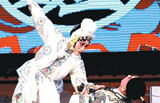Is Monkey King making history in animation industry?
Updated: 2015-07-22 08:50
(Xinhua)
|
|||||||||||
"Chinese people have their own values, which means we don't need to follow the mindset of the West, especially that of the Hollywood," he stressed.
The values conveyed in the animation include perseverance and courage, according to Tian.
The main character of Dreamworks' "Kung Fu Panda" franchise was not purely East, as low-profile is appreciated in the culture of the East. As for Disney's "Mu Lan" series, while people were impressed by the beautiful landscape depicted in the film, some of the film's elements, such as the coming-of-age ceremony, are not authentically oriental.
He believed he was making an animated film with distinct Chinese style, though he admitted he blended the advantages of both Japanese anime and Hollywood cartoons into it.
"We used our own traditional stories to resonate with our audiences' emotions, and technically we tell the story by means of the West," said Tian.
A right film at right time
In addition to sophisticated special effects and good design, Lu Wei, who was in charge of the operation and planning of the animation, also attributed the film's success to the timing of releasing.
"If it were two years ago, the film would have little chance to take in that much money," Lu said.
With new methods of funding, backed by the government's "Internet Plus" drive, they were able to rise more than 7 million yuan using online finance platforms in one instance.
Those who contributed 100,000 yuan through Internet finance were able to see their children's names shown on screen when the film ended. The move not only helped fund the film, which took 8 years to make, but also worked as good advertising, according to Lu, founder of Beijing-based Skyfilm Capital.
Online advertising featuring celebrity endorsements from names like Ma Yun, founder and chairman of China's e-commerce giant Alibaba, and Huang Xiaoming, a famed actor, also made it easier for the film to reach audiences.
Fans of the Monkey King also shared reviews and posters of the film on Wechat, a mobile messaging app, which has about 500 million users.
In traditional marketing, most advertising is done on paper, in the streets and theaters.
This is part of the reason most Chinese animated films find it hard to reach the 100 million yuan box office benchmark, according to Lu. One recent animation, "Dragon Nest: Warriors' Dawn", received great reviews from the audience, but only earned about 55 million yuan.
Tradition is a treasure house for animation
The majority of Chinese animation fans, if not all of them, have grown up with foreign cartoons, including Doraemon from Japan and Iron Man from America.
That is the predicament for China, now the second largest movie market in the world, which has produced numerous animation films but few characters that have global influence.
"Monkey King: Hero is Back" might change that.
Its success has revealed China's traditional culture can provide a gold mine for potential popular characters, said Rao Shuguang, the secretary-general of the China Film Association.
Rao believes "Monkey King: Hero is Back" was a turning point for Chinese animation, which has been struggling to compete with imported works.
Tian is also confident Chinese animation will develop to a level that can rival Hollywood sooner or later.
But not all are so optimistic. Some analysts said that a lack of originality, creativity and cartoonists, would pose major obstacles for Chinese characters to achieve global popularity.
The "Monkey King: Hero is Back" has also been criticized by some as copying the images and scenes of "Kung Fu Panda" and "Shrek".
Related Stories
New Monkey King brings hope to Chinese animation 2015-07-20 14:00
'Monkey King: Hero is back' ignites passion of audience 2015-07-14 10:11
True and False Monkey King 2015-05-25 09:49
Monkey King gets wax replica 2015-05-05 16:20
Monkey King worshipped as god in Fuzhou 2015-02-26 15:40
Today's Top News
Another month, another global heat record broken
Forbidden City enters Secret Garden for different shade
Chinese soccer player Zhang joins Spanish club on loan
Navy starts exercise in S. China Sea
Chinese-led investor group wins auction for bankrupt Spanish airport
New Development Bank backed by BRICS launched in Shanghai
UK's Osborne tightens screws on government spending plans
Searching for ET: Hawking to look for extraterrestrial life
Hot Topics
Lunar probe , China growth forecasts, Emission rules get tougher, China seen through 'colored lens', International board,
Editor's Picks

|

|

|

|

|

|






